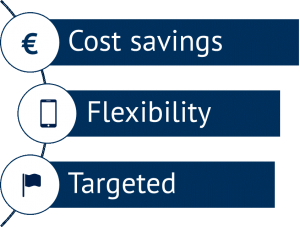Repeatedly working people ask themselves the question in which form they could improve their knowledge – besides all the everyday stress in their regular job, in their family and in other activities. Classic seminars traditionally play a major role, but the offer of online training has caught up considerably in recent years. In this blog post, we highlight the pros and cons of the various formats and provide suggestions for your next training course.
Different needs and objectives
Linda and Robert know each other from university. They both work in the energy industry, Robert at a regional utility, Linda at a large renewable direct marketer. During their last phone call, both talk about which training courses they want to attend soon. In the process, they discover that they have quite different requirements.
Robert has only recently switched to the utility and still needs a basic understanding of the principles and processes in the energy industry. He also wants to build a network of potential partners. This could be useful to him in his role in the business development department. From his studies, Robert knows that he can learn best together with other people. He often has critical questions and needs a direct exchange with the experts to get answers quickly.
Linda has been involved in various customer projects at the direct marketer for several years. In order to combine work and family, she works six hours a day, mostly from home. Long training days plus travelling are therefore not an option. She uses various online platforms to communicate with her colleagues and works efficiently in this way. In addition, she has very specific questions for which she is looking for compact training courses to help her get ahead in her projects.
What can a live online training achieve?
The two people have very different needs for the format of their training. The classic seminar has existed for many decades as an established way to develop professional skills and knowledge. The various forms of online training have only taken their place in the field of education in the last decade.
Live online training (also known as a webinar), i.e. a virtual meeting to impart knowledge, offers many advantages over a seminar with physical contact: First, live online training reduces travel costs for the participants’ employers (travel, accommodation). In addition, it also leads to a saving in working time, as there is no need to travel. Participants are also not blocked for whole days, as most live online training courses last between one hour and half a day.
Thanks to optimized technologies and better internet skills of the participants, the effectiveness of the online training has improved enormously. Since a certain level of IT competence is now part of many professions and everyday life, the barrier to knowledge transfer via organized online offerings has fallen.
In addition, good video quality and a wide range of tools and apps improve the interaction between trainer and participants or between the participants themselves, although there are still undoubtedly differences to personal contact.
The use of live online trainings allows topics that are narrowly defined and therefore targeted to find a larger audience. Professionals with specific information needs may be more likely to participate than in a one-day seminar, where part of the program is either known or not relevant to them.
From a provider’s perspective, there is also more freedom to design training programs. By cleverly dividing the learning material into blocks, the provider enables participants to reflect or apply at work what they have learned between the training blocks. In this way, questions that are more specific can be discussed again later and the learning success can be ensured. The degree of flexibility increases through shorter training units, but this must be used prudently.
Apart from this, an important aspect is also the handling of technological dependencies that cannot be completely controlled by the provider. This includes the aspects of stability of the internet line, both for the sender and the receiver as well as the compatibility of tools and platforms with the devices of the learner. A careful selection of the appropriate tool can save a lot of frustration.
Courses, however, for which the use of role-plays, conflict resolution or group work is important, still have a hard time in online format. Even topics such as communication (rhetoric, leadership, teamwork) or sales require a higher degree of personal interaction and feedback than online training can provide.
When are face-to-face trainings better?
For the latter aspects, face-to-face training is certainly more suitable. In many cases, direct contact between trainer and participants is important as the body language helps in the learning process: What is particularly important, what is meant ironically, what is critical and what is an assumption?
The same is true for the opposite direction: With the body language of the participants the trainer can see if the audience is confused or bored – and then react to it. Certainly, there are technical solutions for this in live online training, but they require conscious control.
Discussions among the participants, in which everyone can contribute their expertise and experience, function more smoothly if everyone can see each other in the same room and a moderator provides guidance.
The casual conversation during the coffee break or at lunch can be the beginning of a business relationship – or it can be a look beyond one’s own nose.
A seminar day in a particular seminar room also offers the opportunity for all participants to concentrate exclusively on the seminar topics. The attention is not divided – as long as laptop and smartphone are put aside – by popping up e-mails or many other disturbing factors.
In addition, it is attractive for many to get away from the office and the familiar surroundings. Moreover, you take a whole day off from work. This means, you want to benefit as much as possible from this seminar and hence, you focus. Learners perceive a day at the seminar not as a short interruption of the daily work routine, but they appreciate it.
What does Energy Brainpool offer?
Whether live online training or face-to-face seminar – this choice is not only for individuals, but also for superiors for their teams and departments. Energy Brainpool extends its offer of open trainings and in-house trainings by the area of live-online trainings.
This enables our customers to stay informed about current developments in the energy industry or to receive further training on fundamental issues – in the changing world of the electricity market, renewable energies and more.
With the Energy BrainSessions, Energy Brainpool will offer an interactive format for knowledge transfer via live online training from April 2020 onwards. Similar to the Energy BrainDays (the open face-to-face seminars), we will present both the basics as well as profound and current specialist topics relating to the energy industry – and discuss them with the participants.
The only difference is that the participants of the BrainSessions stay in their office or at home, wherever they like. The Energy Brainpool Experts will be happy to advise you and support you in choosing the format and topic for your training needs.






